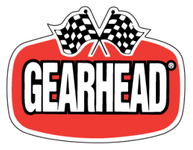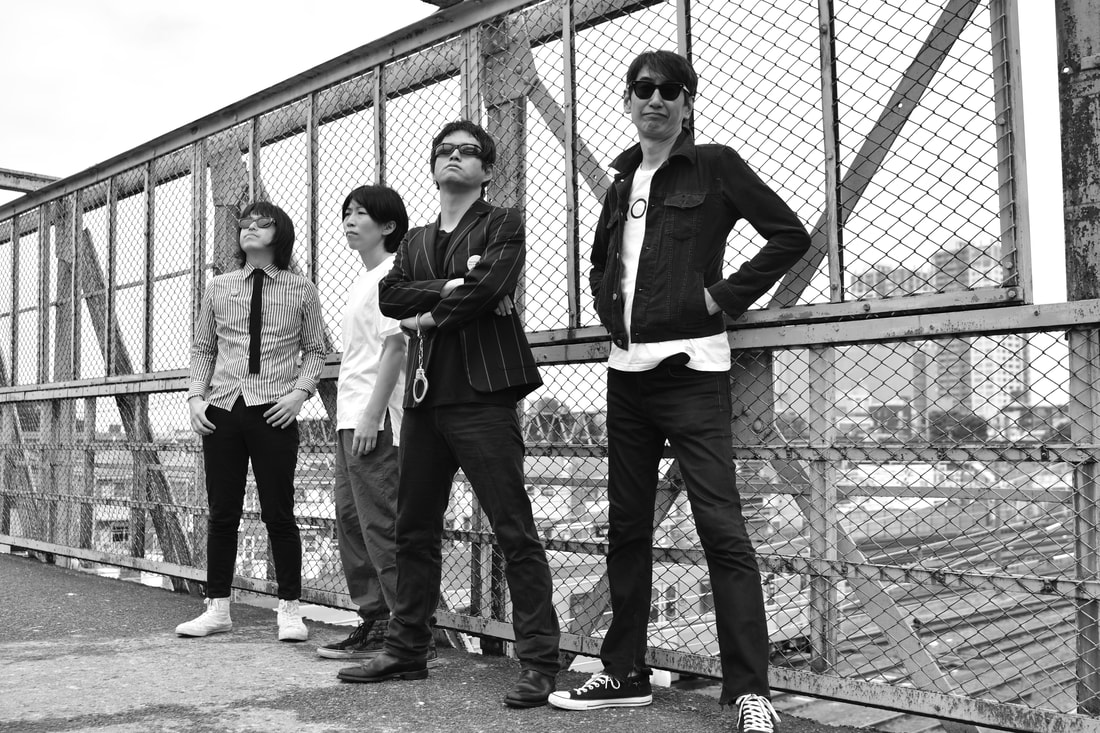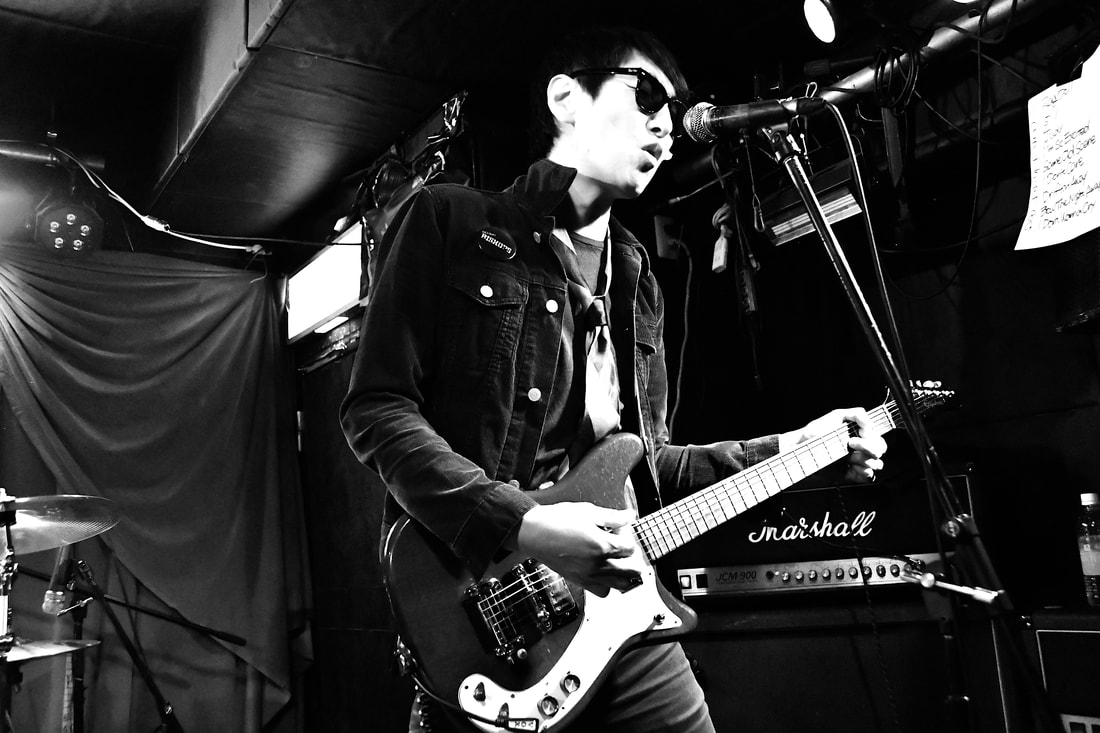|
International tours are daunting, especially the first time around for any band. It's a significant expense financially and with time to leave a lasting impression on an uncharted territory to a new audience.
Let's take Japan's rock n' roll scene world, which left different impressions upon Western audiences from different portrayals by the American publicity machine over the last few decades. Not everyone can have the white rhino mass exposure scenario that Shonen Knife received in 1991 when Kurt Cobain gave them an endorsement that catapulted the Osaka trio from dwellers within the American independent circuit throughout the 1980s onto a larger platform with a deal with Capitol Records and subsequent Stateside festival date with Lollapalooza which followed. Tokyo trio, The 5.6.7.8's, received a similar break, albeit from a paralleling industry, when Quentin Tarantino recruited the women to perform a handful of songs in his movie Kill Bill. The move kicked up the women's status from a small-time garage band into in-demand performers across the West, with their music further engrained into the American pop culture consciousness when Vonage licensed their take of a Rock-A-Teens song for a national commercial.
Those two examples are “stars align” exposure moments for any small-time artist’s career—an industry top-tier tastemaker endorsement for the general American public to draw a baseline opinion. The rest had to forge their baseline through, and plenty of Japanese garage rock bands from the 1990s did just that when coming Westward. Supersnazz toured the United States. Their high-energy shows got the attention of the Seattle scene, which led to a Sub Pop signing and, eventually, Sony Japan taking an interest in the quartet’s work. Guitar Wolf’s tendency to lean towards a skull-piercing trash n’ roll sound gone Mach 2 resonated with Oblivians founder Eric Friedl so much that he effectively launched Goner Records when issuing their Wolf Rock! album in 1993. Touring commenced across the US for the Tokyo trio, with Matador Records brass convinced enough to be the other US label to sign the three for 1996’s Missile Me. A Japanese major handled their homeland releases for the majority of their still-going career with another roundabout to America via a licensing deal with Third Man for Love&Jett in 2019.
Every band has a different avenue for discovery. Fink knows that all too well and has lived it himself with his bands. Fink’s name will ring a bell to American followers of the 90s garage punk from his short yet impactful time crisscrossing the States with him and his brother’s (Fifi) band Teengenerate. For a band that was active for only three years, their catalog makes it seem like they were around much longer, with two LPs and slews of singles scattered across Australian, Japanese, and American trash rock labels like Crypt, Estrus, Dog Meat Target Earth, and many others. However, Teengenerate wasn’t his first foray onto American shores; Fink and Fifi’s prior band, American Soul Spiders, struck a deal with Sympathy For The Record Industry, which gave them the idea to go West, but as a sight-seeing mission instead of rocking faces. Their straight-ahead firebrand style of rock over America came on their next trip West via an invitation by Estrus honcho Dave Crider in 1993 for an appearance in Bellingham, WA, at the Garage Shock festival. That initial trip helped Fink and company with multiple returns across the Pacific until 1996 when Teengenerate split. Since that excursion, Teengenerate built a reputation in the States with their rowdy gigs and high-octane punk assault recordings. Singing their lyrics in English gives them a steady fanbase to build off of, with Fink and Fifi’s more melodic band Firestarter and Fink breaking off to form The Raydios and Ruler. However, none of these bands has returned to tour the US as often as Teengenerate before the post-9/11 world. Fink’s return to the United States in the last few years has been for festival appearances at Mosswood Meltdown in Oakland, CA, under the Firestarter banner in 2018 and two years prior, performing a handful of Teengenerate songs alongside Japanese rockers The Thundderoads. Fink’s new undertaking is now off the ground with Angel Face, who’ve released their debut album through Slovenly Recordings, and talks about touring the United States, the Toyko rock scene, and his plans with Angel Face.
Photography by Takada Yuko
Where did you and your brother grow up in Japan, and what were your childhoods like? Was there anyone in your family who really nurtured your guy's musical tastes early on or encouraged you to discover different styles of music outside of what was popular in Japan?
Both my brother, Fifi, and I were born in the mid-’60s and grew up in a rural port town about two hours from Tokyo. He got a shortwave radio around when he was ten years old, so we both started listening to a lot of foreign music that was rarely on Japanese radio. We loved rock, punk rock, and disco music from the US and UK on time, but old rock'n'roll, blues, and soul music from the ‘50s and '60s were also favorites. Outside of music, did you two share any other mutual interests? Before music, were there any early aspirations you held growing up? Bruce Lee was it! And reading novels and manga, maybe. How were you and your brother discovering music together, young kids, and who was the first to discover punk rock ultimately? Were you first drawn into music from some of the Japanese bands of the 1970s, or was it the Western bands that grabbed your attention initially? I remember Fifi was excited to find a Sex Pistols single at a supermarket in '77. But after thinking it over, he chose Abba instead of it. I don't think he made the wrong choice. Most of our friends liked Japanese rock bands rather than US/UK stuff, but we didn't. The exceptions were Stalin and The Badge and Western bands like The Stones, The Who, Dolls, MC5, Raspberries, Ramones, Stranglers, Knack, etc. How were you two continuously accessing information about new bands emerging in the country and different parts of the world? Were you mostly getting information via word of mouth, or was there a zine network you two knew about that kept track of all the different bands and tours around the country and abroad? From that shortwave radio and few zines, and when I was around 12 or 13 years old, a record rental shop opening near my house was a big thing. I used to listen to a lot of records there. Though we had little music information, we might know much more than the people around us. Was Shimokitazawa always the main neighborhood where local and international punk/garage bands tour back through? Has it managed to keep the same atmosphere it had when you and your first formed American Soul Spiders? Around ’83, when I moved to Tokyo, it was popular as an independent theater for young kids, not as music, though there were a few venues and record shops. But when I started Teengenerate in the early '90s, we often played there. And many clubs opened at the same time. The other old areas where many clubs opened had something like their own traditions, so it was hard for us to do.
Did you and your brother move to Tokyo with the intent to start American Soul Spiders? I was reading on the Keen Reaction blog that you guys had trouble finding like-minded people initially, and you two didn’t feel like you fit in with what was happening around the city. Can you elaborate on that?
No. Fifi moved to enter a college in ’81 or '82. I did the same thing, but it was an excuse to come to Tokyo to find someone to play with. But like you say, I couldn’t find anyone for over a few years because heavy metal occupied Tokyo then. So I asked Fifi who started playing guitar. We two formed a band called Westside Jet Boys for a few years, but no one could fit in. After splitting the band, I started American Soul Spiders with Sammy around ’88. And a year later, Fifi joined us after leaving a band. I don’t know if you can answer or elaborate on this question, but was there a consensus felt among some of the other Tokyo-based bands who managed to tour the US earlier in their careers that they, too, didn’t mesh with what was happening in the city at the time? What was the general attitude around the city's punk music scene, and was the city a hyper-competitive place for all bands, regardless of genre The time was for metal, grunge, and melodic hardcore. The people wanted fast, heavy, and violent things. And most bands sang in Japanese. They were much different from what we listened to and wanted to play. Meanwhile, we played originals in the style of Birdman-influenced garage rock and sang in English, so only a few people came to our shows, and the club owners lectured us as to why I didn't sing in Japanese. American Soul Spiders had no place to play, and no bands played with us. The only exception was Super Snazz. Then, I decided quickly to leave Japan to play in the US. At the time of Teengenerate’s start, labels were transitioning away from vinyl to the CD format. However, you guys continued releasing single after single on the overseas labels for the band’s duration. Were you guys a popular find in a record store’s import section, and were these steady partnerships with European and American labels helping you gain some sort of cult status within Tokyo because your music wasn’t being released by a Japanese company outside of Target Earth and Wallabies? First, we have never been in such a cult status. No, like your country and others, people here loved rock'n roll and bought vinyl records by the mid-'90s. Like many other garage bands then, we didn't intentionally release it on vinyl, but the label wanted to release it on it. I'm glad to have it on vinyl instead of CD because I don't have a CD player. You first came to the US as American Soul Spiders when SFTRI released your first single but as tourists. Was that your first trip to the States? During that trip, what groundwork did you lay down that made returning to tour the country that much easier for you all later on when Teengenerate came back to the US in May 1993? Yes, to both questions. On the first visit, the singer and the drummer couldn't come with us, but we had the instruments on us. We had thought that if we went over there, someone would play drums for us, and I could make it work, but it just didn't. But we were convinced that we should have played in the US, and we made so many friends who would help us on the first tour.
What were your impressions of the American and European audiences the first time you toured overseas? Were you planning your US tours around your invitations to Bellingham for consecutive appearances at Garage Shock in 1993 and 1994? How did the opportunities for Teengenerate to tour Europe present themselves, and how did you work out the logistics?
The audiences on the tours were totally great. We were never so welcome in Japan. Yes, in the first two years, we planned the US tour around Garage Shock, the greatest show event that Estrus was organizing in Bellingham. Tim Warren planned the Euro tour with Gaunt and New Bomb Turks in ’94 to promote our album Get Action. In the Keen Reaction blog, Maso talks about Teengenerate’s live set, playing mostly cover songs and incorporating originals by the Savage!!! came out. Initially, was Teengenerate started as a covers band? No, it wasn’t. In the early days of Teengenerate, I tried to write simple, solid punk rock songs, but my habits from my American Soul Spiders days got in the way, and it was difficult to do so. Once I got used to it, it was getting better. Did you guys feel like outsiders in your own country with how popular Teengenerate was becoming abroad? Or was it a factor in shared camaraderie between groups like you, Guitar Wolf, The Registratror, Supersnazz, and The 5.6.7.8's, who often toured the United States throughout the 1990s? Outsiders, maybe that. I was bored playing here and thinking of escaping Japan to live in the U.S. But after many international releases, everything around us suddenly changed. Then, our live show attendance went up, and those garage bands asked us to play together. The club managers didn’t ask us to sing in Japanese anymore because those bands started to sing in English then.
Fink in action! - Photography by Takada Yuko
What led to you wanting to go in a more melodic direction with Firestarter? Did you develop the idea for Firestater’s musical style while writing for Teengenerate in the three years of the band’s activity? What lead to your departure to go back to the Raydios?
Fifi wrote most of the Firestarter songs. In the early days, the band was still a three-piece doing more eccentric, primitive punk rock, but when I joined in early '98, I told them that it would be a shame if he didn't sing songs like The Tweezers, a great power-pop band he was doing alongside Teengenerate around '95 and we must have done both types of songs. Fifi Had asked me to join Firestarter since I formed The Raydios with Sammy in '97. He was so insistent that I decided to join it. So, my band broke up once. Did The Raydios ever make it abroad like your other bands have at this point in life? Unfortunately not, we put some records out of foreign labels, including Slovenly. How did the idea to form Angel Face come about? How far back do you go with the other members of the band? When Toyozo from Fadeaways asked me to join a new band in March '21, I told him OK because I had left a band called Ruler a few months before and hadn't done anything. We haven't had any particular concept for the band now and then and just played the songs we could. The other two members are Rayco, who used to play drums in Ruler, and the singer, Hercules, who joined the band in July of '21. All the members are old friends of mine. The second half of 2023 was active for Angel Face, with two singles and the debut album seeing release at the end of the year. Do you guys have any other recordings in the works or plans to tour outside of the country in the works for 2024? We’ll have a demo recording session for new tunes in January or February and some gigs by March. And we may go to Europe around in Autumn if they want. Nothing is confirmed yet about this. You’ve done so much in music already, gone places that not a lot of people can go to, and have likely influenced tons of bands and labels around Tokyo, for that matter. What else do you want with music or with your life going forward? I think I’ve done almost nothing in music and other areas yet, but I’m satisfied with my life so far. I will live by writing and playing as many songs as possible because I like it so much. It’s my life. What advice would you give a kid who wants to pursue a similar path as you? Any famous/regrettable last words? I'll give them words by Bruce Lee: "Don't think, feel!" Angel Face's S/T debut album and new 7" is out now via Slovenly Recordings. Keep up with where Angel Face roams through their Instagram. Interview by Eli Grisham. |
Author
Archives
July 2024
Categories
All
|



 RSS Feed
RSS Feed